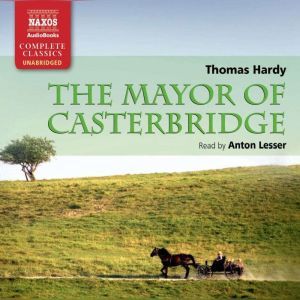

The Mayor of Casterbridge
Author: Thomas Hardy
Narrator: Anton Lesser
Unabridged: 12 hr 20 min
Format: Digital Audiobook Download
Publisher: Naxos
Published: 07/26/2010


Author: Thomas Hardy
Narrator: Anton Lesser
Unabridged: 12 hr 20 min
Format: Digital Audiobook Download
Publisher: Naxos
Published: 07/26/2010
Thomas Hardy (1840–1928) was an English poet and regional novelist whose works depict the county "Wessex," named after the ancient kingdom of Alfred the Great. Hardy's career as a writer spanned over fifty years, and his work reflected his stoic pessimism and sense of tragedy in human life.
Hardy was born in the village of Higher Bockhampton to a master mason. Hardy's mother, whose tastes included Latin poets and French romances, provided for his education. After schooling in Dorchester, Hardy was apprenticed to an architect. In 1874, Hardy married Emma Lavinia Gifford, for whom he wrote (after her death) a group of poems known as Veteris Vestigiae Flammae ("Vestiges of an Old Flame").
At the age of twenty-two, Hardy moved to London and started to write poems that idealized the rural life. An assistant in the architectural firm of Arthur Blomfield, Hardy visited art galleries, attended evening classes in French at King's College, enjoyed Shakespeare and opera, and read works of Charles Darwin, Herbert Spencer, and John Stuart Mills. In 1867 Hardy left London for the family home in Dorset. There, he continued his architectural career but started to consider literature his "true vocation."
Initially, Hardy did not find an audience for his poetry, and the novelist George Meredith advised Hardy to write a novel. The Poor Man and the Lady, written in 1867, was rejected by many publishers, and Hardy destroyed the manuscript. His first book to gain notice was Far from the Madding Crowd. After its success, Hardy was convinced that he could earn his living with his pen. Devoting himself entirely to writing, Hardy produced a series of novels, including Tess of the D'Urbervilles and Jude the Obscure, both of which met with public disapproval due to their unconventional subjects. This controversy led Hardy to announce that he would never write fiction again.
After giving up the novel, Hardy brought out a first group of Wessex poems, some of which had been composed thirty years before. During the remainder of his life, hecontinued to publish several collections of poems. Upon the death of his friend George Meredith, Hardy succeeded to the presidency of the Society of Authors in 1909. King George V conferred on him the Order of Merit, and in 1912 he received the gold medal of the Royal Society of Literature.
After Emma Hardy died, Thomas married his secretary, Florence Emily Dugdale. From 1920 through 1927 Hardy concentrated on his autobiography, which was disguised as the work of Florence Hardy. It appeared in two volumes. Hardy's last book was Human Shows, Far Phantasies, Songs and Trifles. His Winter Words in Various Moods and Metres appeared posthumously in 1928. Hardy died in Dorchester, Dorset, on January 11, 1928.
welcome to...THE MAYOR OF SEPTEMBERBRIDGE. this is the latest installment of project long classics, a series in which i read books over the course of a month as an excuse to make puns and buy penguin clothbounds. this month, we arrive at a lesser-known hardy, whose claim to (my personal) fame is havin......more
this is hardy's most perfectly-constructed novel. there are others that are more appealing, to me, (am i allowed to say that?), but this one is such a perfect cause-and-effect, every-action-has-a-reaction kind of book, that it should really be his most popular and successful, instead of tess, which......more
I just love 'classic reads' like these, you pick up a book with a 19th century cover and feel, and within a few pages you read that an angry and drunk man arguing with his wife, ends up auctioning her and his baby daughter to a passing sailor! Sober the next day, he's too late to find them, so he pl......more
Michael Henchard an itinerant, young, annoyed farm worker, walking with quiet wife Susan, infant daughter Elizabeth -Jane, looking for employment, the time, the early 1830's, in southern England, after an exhausting journey they reach a country fair, in a small village, enter a crowded tent, with du......more
Ooof, finally finished this trudge trudge trudge of a book, and it isn’t even that long. Maybe I’m getting feeble but Thomas Hardy’s manytentacled sentences and trillion 19th century rural slang words presented a north-face-of-the-Eiger challenge for my little brain – strange words like clane, fello......more